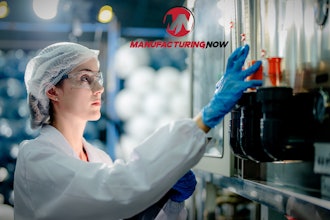Editor's Note: Download the audio version below and click here to subscribe to our newsletter.
This week, Ash Ganley, CEO of GrowRay Technologies, discusses his collaborative manufacturing R&D effort to create patented LED lighting solutions for cannabis cultivation.
Ganley is the former CTO of NOBO, a small, vertically integrated multi-state operator based in Boulder, Colorado. During his time at the company, he observed the fractured, isolated nature of cannabis cultivation product development, particularly in lighting, and figured that he could find a better way of doing business.
Cannabis lighting lacked research & development and efficiency, mostly because non-cannabis technology vendors were marketing to an industry emerging from a pre-legal growing culture. Essentially, operators didn’t know what they didn’t know, and lighting manufacturers took advantage of the situation. It created a lack of trust and transparency that caused a lot of waste in the industry.
Early generation LEDs didn't work because they were essentially rebranded warehouse and commercial lighting fixtures. Known as "shoebox fixtures," they offered a bad form factor and a non-uniform cone of light. Early LEDs generated a flashlight effect -- too much light directly underneath, and not enough on the edge, which led to conical grows. The fixtures were also being cooled by off-the-shelf computer fans, which caused them to fail thermally.
Although LED technology was a hard sell two years ago, times have changed, and the technology is being embraced by cultivators to increase efficiency, productivity and sustainability. Cultivators are more willing to embrace LEDs, as well as the associated standard operating procedures (SOPs), to get results equal to or better than legacy products, with the added energy savings.
GrowRay recently received a new patent for its Triangular Extrusion Shade Bar. Specifically designed for greenhouse cannabis cultivation, the shade bar delivers a uniform footprint of light. It addresses traditional problems with shading profiles by using a highly polished angled aluminum surface to reflect light from the sun. Other manufacturers have attempted to fix the shading problem by shrinking fixtures, but that has only sacrificed light uniformity.
The shade bar, in development for a couple of years, began as a common sense answer to a common problem: a simple sun reflector concept proved through R&D at GrowRay's assembly shop.
However, product manufacturing is costly, and GrowRay is launching a highly engineered product as cannabis light fixture costs are racing to the bottom, with companies flooding the market with poorly designed products. To remain competitive, Ganley kept the company lean, added strategic partners and took a grassroots approach to marketing. For example, GrowRay works in partnership with NOBO.
Ganley recently set his sights on taking a more holistic, systems approach to cultivation. Soon, GrowRay will not just be a lighting technology company, but an end-to-end technology solutions provider. The company recently ran a program to look for ag tech startups via mentorships and proof of concept tests. The result uncovered a few candidates GrowRay hopes to pull into its portfolio, either with full or partial ownership or strategic partnerships. Ganley wants to be able to offer clients complete cultivation consulting services -- everything from HVAC and controls to fertigation systems -- to offer a kind of grams-per-square-foot guarantee.
During his time at NOBO, Ganley found that the company required a large financial commitment to start up, but had great potential as it scaled and became vertically integrated. As a product manufacturer, it was almost the opposite: needing less initial investment, but becoming more costly as operations ramped up.
Still, Ganley is looking to the future of cultivation, and believes that the next generation of cannabis cultivation technology is actionable data. After all, anyone can collect data from the grow, but it's what you do with that data that can help the business thrive. Cultivators need to have a plan in place to drive specific results; if not, the data is useless. As GrowRay expands into new services, Ganley hopes to soon create a dashboard -- or a centralized control system -- that will provide more useful data to cultivators.
The Cannabis Equipment News Podcast is an interview series with growers, processors, manufacturers, distributors and other professionals who work within the legal cannabis industry.
Please make sure to like, subscribe and share the podcast. You could also help us out a lot by giving the podcast a positive review on Apple podcast or whatever platform you use. Finally, to email the podcast, you can reach David Mantey at David @cannabisequipmentnews.com with “Email the Podcast” in the subject line.






















